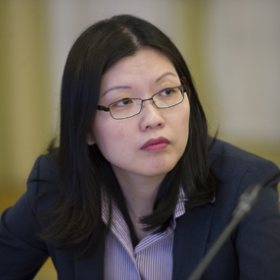
Fostering U.S.-China Military-to-Military Relations
Retired high-level generals from China and the United States meet to discuss pressing issues in the relationship between the two militaries.
From June 16 to 19, 2012, senior retired flag officers of the U.S. Army, Navy, Marine Corps and Air Force met with Chinese retired senior generals of the People’s Liberation Army to discuss pressing issues in the U.S.-China military-to-military relationship. This fourth iteration of the bilateral talks between retired senior officers, known as the Sanya Initiative, spanned two days of private dialogue at the United States Naval Academy in Annapolis, MD, and two days of meetings with senior elected officials and policy experts in Washington, D.C.
The six principal Chinese delegates, in order of seniority, were:
- Gen. Li Qianyuan, former Commander of PLA Lanzhou Military Region
- Gen. Zhu Qi, former Commander of PLA Beijing Military Region
- Adm. Hu Yanlin, former Political Commissar of PLA Navy
- Gen. Zheng Shenxia, former President of the Academy of Military Sciences
- Lt. Gen. Wang Liangwang, former Deputy Commander of PLA Air Force
- Lt. Gen. Zhao Xijun, former Deputy Commander of the PLA Second Artillery Force
The six principal U.S. delegates, in alphabetical order, were:
- Gen. James Cartwright, Former Vice Chairman of the Joint Chiefs of Staff
- Gen. Kevin Chilton, Former Commander of U.S. Strategic Command
- Lt. Gen. Dave Deptula, Former Deputy Chief of Staff, U.S. Air Force
- Adm. William Fallon, Former Commander of U.S. Central Command
- Adm. Edmund Giambastiani, Former Vice Chairman of the Joint Chiefs of Staff
- Adm. William Owens, Former Vice Chairman of the Joint Chiefs of Staff
For the first time in the Sanya Initiative’s four-year history, the EastWest Institute (EWI) was involved in the coordination of this meeting, in cooperation with the Chinese Association for International Friendly Contact. EWI’s President and CEO John Edwin Mroz, Vice President for the Strategic Trust-Building Initiative and Track 2 Diplomacy David J. Firestein, Chief of Staff James Creighton, and China Program Senior Associate Piin-Fen Kok also participated in the discussions.
The Annapolis talks covered a range of topics of military and political importance to the United States and China. Delegates held sessions on the U.S. rebalancing, or “pivot,” to Asia, North Korea, the South China Sea, U.S. arms sales to Taiwan, America’s Air-Sea Battle Concept, Afghanistan, Pakistan, and managing the U.S.-China military-to-military relationship. While there was consensus on some issues and disagreement on others, both sides agreed that cultivating communication and mutual understanding between the militaries of the United States and China is essential for fostering the cooperation between the two nations necessary to address the world’s most difficult issues.
“We are two strategic nations, and we must act in strategic ways because of influences we have around the globe and because of the leadership that we demonstrate around the globe for all other nations,” Gen. Cartwright noted in his remarks in Annapolis. “[But] it’s very important for all of us at this table to realize that if the United States fails as a nation or if China fails as a nation, we both fail.”
Gen. Li Qianyuan, the Chinese delegation leader, expressed a similar sentiment.
“The U.S. and China have a shared desire to strengthen coordination and cooperation on most major issues and to develop a new type of state-to-state relationship to the benefit of both of our peoples and the peoples of the world. Coming together through the Sanya Initiative, we will surely help to deepen mutual understanding, build mutual trust, reduce misunderstanding, and promote the great cause of friendship between our two countries.”
The second half of the Sanya Initiative meeting took place in Washington, D.C., where the U.S. and Chinese delegates held discussions with Senators Carl Levin (D-MI) and John McCain (R-AZ), respectively Chairman and Ranking Member of the Senate Arms Services Committee, and Representatives Charles Boustany (R-LA) and Rick Larsen (D-WA), Co-Chairmen of the House U.S.-China Working Group. The delegates visited the Pentagon to meet with Mark W. Lippert, Assistant Secretary of Defense for Asian and Pacific Security Affairs, and Lieutenant General Terry Wolff, Director, Strategic Plans and Policy, Joint Staff, J5. At the State Department, the delegates spoke with Kurt Campbell, Assistant Secretary of State for East Asian and Pacific Affairs. The delegates were also invited to dinner by former Speaker of the House Dennis Hastert and former Democratic Leader Richard Gephardt. Prior to traveling to Annapolis and Washington, the Chinese delegation held meetings with former Secretary of State Henry Kissinger, Chairman of the Starr Foundation Maurice Greenberg, and the CEO of NYSE Euronext Duncan Niederauer in New York.
The Sanya Initiative meeting was made possible with the generous support of the Starr Foundation, the MacArthur Foundation, and the China-United States Exchange Foundation.

